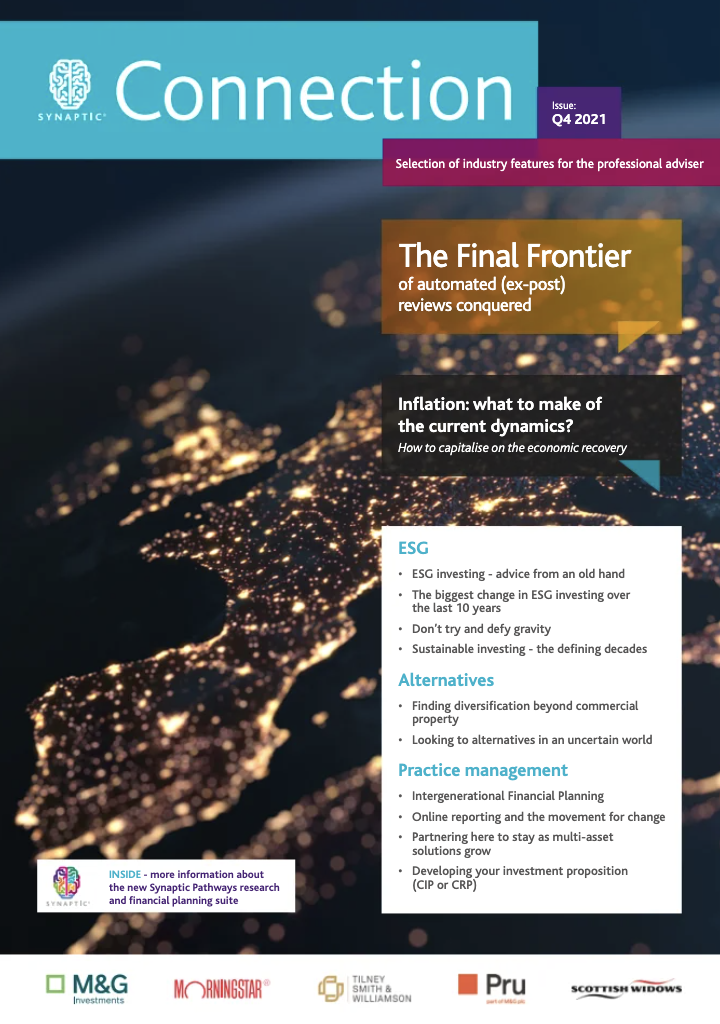In this edition...
- The final frontier of research and due diligence conquered Eric Armstrong, Client Director
- Hours to minutes Eric Armstrong, Client Director
- World Economic and Market Outlook Graham O’Neill, Senior Investment Consultant, RSM.
- Inflation – what to make of the current dynamics Maria Municchi, Fund Manager, Sustainable Multi Asset Fund Range M&G Investments
- Sustainable Investing – advice from an old hand Hugo Thompson, Multi-Asset Investment Specialist HSBC Asset Management
- The biggest changes in ESG investing over the last 10 years Mark Coles, Head of Nationals & Networks Tilney Smith & Williamson
- Don’t try and defy gravity Catriona McInally, Business Development Manager – Investments Prudential
- Sustainable investing – the defining decades Hamish Chamberlayne, Head of Global Sustainable Equities | Portfolio Manager Janus Henderson
- Finding diversification beyond commercial property Shayan Ratnasingam, Investment Manager Liontrust Multi-Asset team
- Looking to alternatives in an uncertain world Chris Forgan, Portfolio Manager Fidelity Multi Asset
- Developing your investment proposition (CIP or CRP) David A Norman (DAN), CEO, TCF Investment
- Intergenerational Financial Planning Gareth Davies, Pension Specialist, Scottish Widows
- Is your online client reporting up to scratch? Natalie Holt, Content Editor, The Lang Cat
- Partnering here to stay as multi-asset solutions grow Antony Champion, Head of Intermediaries, Brewin Dolphin
- How to Capitalise on the Economic Recovery, Including Morningstar’s Portfolio Positioning Leslie Alba, Associate Director, Research Morningstar Investment Management Europe
- Unemployment insurance is back Kesh Thukaram, Co-Founder Best Insurance
After a relatively quiet summer, there are numerous reasons to believe that volatility in financial markets will increase in the coming months. The economic backdrop is entering a period of increased uncertainty as the growth that followed the easing of lockdown restrictions this year fades. In the US, the Federal Reserve tapering asset purchases as well as debt ceiling negotiations, have the potential to increase volatility. Meanwhile in China, the recent change in policy direction has caused disruption in local markets and has the potential to spread into global assets, especially if it dampens China's economic growth.

"Alternative credit providers such as private debt lenders have filled this void, creating a more accessible, rapidly expanding US$850 billion market, which has grown from US$100bn in little over a decade."
The price of real assets often rises in line with inflation and many alternatives provide contractual cashflows with inflation protection built in. In addition, alternatives generally have different drivers of return to equities and bonds and can therefore provide diversification benefits – a particularly attractive attribute in today's uncertain world. Here, we summarise some of the less well-known types of alternatives and how we use them in our Multi Asset Open range.
Private equity
We believe that private equity can offer compelling risk-adjusted returns and diversification, but only if accessed through a rigorous and research-based approach. Instruments can vary by size, stage of investment, geography, industry and overall investment strategy, with the growth stage of the underlying companies being a key focus. Our team considers a range of factors, including team and experience, quality of limited partners, performance in different market environments, strength of deal origination process and performance versus peers. This isn't an exhaustive list and no single element of a strategy will give us the full picture.
Within this space, we invest in Chrysalis Investments, which is a large British investment trust dedicated to investing in a portfolio of UK and European private companies with long-term growth potential. The fund invests in later-stage technology companies that operate in large addressable markets and benefit from structural tailwinds.
Absolute return strategies
These aim to deliver positive returns irrespective of market conditions. We currently hold a position in the Majedie Tortoise Fund, a global long/short equity fund that has a top-down macro-driven investment process. It primarily invests in long and synthetic short positions in equities over rolling three-year periods, with less volatility than a conventional long-only equity fund.
We also hold a position in the Brevan Howard Absolute Return Government Bond Fund. The fund uses long-short strategies and tools similar to those employed by macro hedge funds but in a low-cost UCITS format. It aims to have a diversified portfolio of multiple exposures, predominantly to certain interest and inflation rates, as well as foreign currencies, with a pro-active approach to risk management. It combines multiple drivers of returns capable of delivering results returns in a wide range of market states.
Music royalties
These are the payments generated from owning rights to musical works. These payments reward royalty holders – typically artists, writers, publishers, and record labels – whenever their music is purchased or used, be it through downloads, streams, advertisements, or public performances. The rights typically last the best part of a century, protected by copyright law, with details dependent on the type of royalty and the jurisdiction.
In the secondary market, rights can be sold on by the original owners. Shareholders can get a healthy income from unique, long-lived alternative assets. Music royalty cashflows should in theory be agnostic to broad economic growth and the health of the corporate sector, making them a valuable diversifier in portfolios.
An example of an underlying strategy we use within this space is the Round Hill Music Royalty Fund. The fund aims to provide investors with an attractive level of regular and growing income from investment primarily in high quality intellectual property.
Private debt
This is a growing alternative asset class, focused on debt extended to privately held companies, usually by non-bank entities. Following the 2008 financial crisis, which exposed severe fragilities in the banking sector, regulators around the world increased capital requirements to strengthen the resiliency of financial institutions. This reduced the capacity of traditional lenders like banks to provide financing to middle market companies, creating a gap in the market. Alternative credit providers such as private debt lenders have filled this void, creating a more accessible, rapidly expanding US$850 billion market, which has grown from US$100bn in little over a decade.
While there are idiosyncratic risks associated with the asset class, such as illiquidity, complexity, and a lack of information on non-listed private debt funds, private debt can offer higher yields, mitigated risk, and diversification in a broader multi asset portfolio.
Shipping
Shipping is a notoriously cyclical sector, and it has proved a tough place to invest over the last decade. The 2008 financial crisis and subsequent commodity bear market, coupled with an oversupply in ships, led to multi-year losses. But fortunes look to have turned: aggressively rising charter rates in areas such as dry bulk and containers have dominated headlines in the wake of Covid-19 and the ensuing recovery. Whilst some of this strength may prove transient, the longer-term fundamentals of the cycle have staying power.
An attractive opportunity set
Overall, the diversification benefits of investing in alternatives is particularly attractive in the current environment, where the outlook for government and investment grade bonds looks particularly challenged, with real rates low or negative. On the returns side, alternatives also provide the potential to tap into high growth private market opportunities and earn a liquidity premium (the return over that of public markets to compensate investors for being unable to divest quickly).
Against this backdrop, we have moved to add to our position in alternatives manger Brevan Howard this year, which has proven to be a healthy source of relatively uncorrelated returns. We expect this to continue to play an important role in terms of generating returns and managing overall portfolio risk as we head into a more uncertain market environment.
For more information, visit professionals.fidelity.co.uk, email salessupport@fidelity.co.uk or call us on 0800 368 1732.
Important information
This information is for investment professionals only and should not be relied upon by private investors. Past performance is not a reliable indicator of future returns. Investors should note that the views expressed may no longer be current and may have already been acted upon. Fidelity’s Multi Asset funds can use financial derivative instruments for investment purposes, which may expose the fund to a higher degree of risk and can cause investments to experience larger than average price fluctuations. Changes in currency exchange rates may affect the value of investments in overseas markets. Investments in emerging markets can be more volatile than other more developed markets. The value of bonds is influenced by movements in interest rates and bond yields. If interest rates and so bond yields rise, bond prices tend to fall, and vice versa. The price of bonds with a longer lifetime until maturity is generally more sensitive to interest rate movements than those with a shorter lifetime to maturity. The risk of default is based on the issuers ability to make interest payments and to repay the loan at maturity. Default risk may therefore vary between government issuers as well as between different corporate issuers. Reference to specific securities should not be construed as a recommendation to buy or sell these securities and is included for the purposes of illustration only. Issued by Financial Administration Services Limited and FIL Pensions Management, both authorised and regulated by the Financial Conduct Authority. Fidelity, Fidelity International, the Fidelity International logo and the F symbol are trademarks of FIL Limited.
Sign up for updates
Keep up to speed with everything you need to know each quarter, by email or post.


